Which countries are not in lockdown anymore, as UK government announces plans to ease restrictions?


While the UK is announcing plans to ease restrictions, there are many countries around the world that have already started lifting their lockdown.
Some of those countries not in lockdown anymore include those that created restrictions on travel and daily life when the impact of coronavirus was first realised. While others, that are just beginning to open non-vital shops and allow time outside for exercise, are among those worst hit by the virus.
Yesterday evening, Prime Minister Boris Johnson outlined plans to ease restrictions to the UK’s lockdown, including information about when schools will reopen. This included industries such as construction and manufacturing going back to work (but only if they can avoid public transport) and unlimited exercise during the day.
Trying to understand what the next phase of easing lockdown restrictions will look like can be daunting, as we consider things like how social distancing in schools would work and the best way to reopen the economy for business. So although the route out of lockdown for the UK is unlikely to be identical to other countries, it’s reassuring to see what they have been doing to get life going back towards normal.
Which countries are not in lockdown anymore?
China
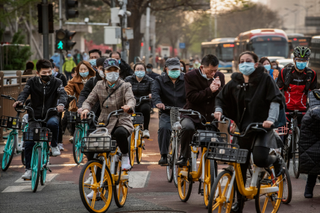
After 76 days in lockdown, the city of Wuhan came out of lockdown on April 8. Earlier on March 25, buses started to resume normal service, quickly followed by trains and on April 3, over 90 per cent of the large scale factories and businesses reopened. Residents were only allowed to to use public transport however, if they could provide a unique QR code that confirmed their positive health status.
China went into lockdown on January 23, but it was only last week that schools started to reopen in some areas under strict conditions - including mandatory mask-wearing, smaller classes and shorter lessons.
GoodtoKnow Newsletter
Parenting advice, hot topics, best buys and family finance tips delivered straight to your inbox.
However on Sunday May 10, the city of Shulan which sits on the border between China and Russia was reclassified as high risk, after new cases of the virus were diagnosed.
South Korea
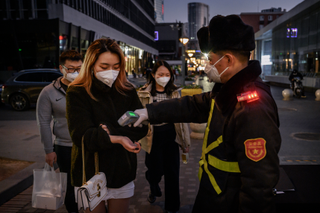
In the country that once had the second largest outbreak in the world, life is just beginning to return to normal as new infections have fallen to less than 10 a day.
In late April, South Koreans began returning to work with enforced temperature checks, social distancing and hygiene precautions in place, while shopping centres, parks, golf courses and some restaurants were reopened. Domestic flights were also permitted, and over the first weekend of May 130,000 people reportedly took their first holiday post-lockdown. On May 5, South Korea further lifted social distancing restrictions with the re-opening of art galleries, museums and libraries.
However after 36 new infections were reported in Seoul on Sunday following a nightclub opening, the city's mayor has ordered many of the bars, nightclubs and discos to close again.
Denmark

As one of the first European countries to announce a lockdown, they are also one of the first to have their restrictions eased. The country announced a month ago that they were entering the second phase of lifting the lockdown, which included the reopening of schools and nurseries.
Some restrictions still apply. According to the BBC, parents and visitors are not allowed onto the school site, children must arrive and leave at different times and queuing to enter schools has become standard.
However, non-essential businesses like hairdressers, salons and other cosmetic services reopened on 20 April. Professional sport was reinstated and shopping centres, cafes and restaurants reopen from today [11 May] with enforced social distancing. Social gatherings are allowed, but they’re limited to 10 people - which is reminiscent of the proposed "social bubble" plan in the UK.
Austria
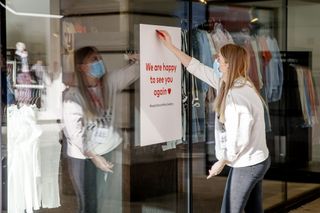
Austria was one of the first countries to lift their lockdown, after they saw their infection rate drop to almost zero.
In April, public parks and small shops, such as DIY stores and garden centres, were allowed to open.
From the beginning of May, gatherings of up to 10 people were permitted, pupils in their final year returned to school and larger non-essential businesses, like shopping centres were allowed to open.
Germany

While Germany began lifting their lockdown in April, Chancellor Angela Merkel assured people that an “emergency brake” would be applied if there was another surge in cases.
Since April 20, shops of all sizes – including bicycle and book shops – were allowed to open, with hygiene precautions and strict social distancing measures in place. Schools have reopened for those pupils taking exams, with all others returning to school in the summer term.
People from two different households are now allowed to meet up with each other, and elderly people in nursing homes are allowed visits from one person. As of this week, art galleries and some museums have also reopened their doors.
France
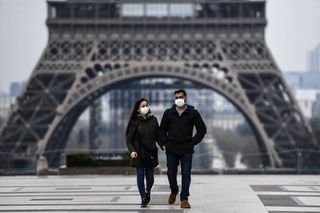
France was another country quick to go into lockdown, with strict restrictions imposed from March 17. Almost two months later, they are seeing their some elements of their lockdown being lifted.
Gatherings are allowed of up to 10 people and from today, schools and nurseries will start to reopen and all shops, aside from large shopping centres, are allowed to open again. Previous travel restrictions that required you to have a certified reason have also been lifted and travel is allowed up to 100km from home via car.
However, rush hour travel is still limited to only those with permission from employers and parks, gardens and secondary schools are still closed.
Which countries are lifting their lockdown this week?
While some countries have already made great progress in lifting their lockdown after seeing infection rates drop, others will begin to do the same from this week.
The Netherlands
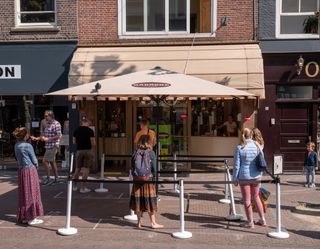
Prime Minister Mark Rutte has released information about a five-phase plan for easing lockdown in the Netherlands.
From this week, libraries will be open to visitors. Hairdressers and other cosmetic salons will also be able to reopen, and primary schools are due to partially reopen as well. Starting from June 1, bars and restaurants, along with secondary schools, will reopen and public transport services will resume. From July 1, up to 100 customers are allowed to attend theatres, restaurants and cinemas.
Spain

Spain had one of the strictest lockdowns in Europe, with children under 14 in lockdown for six weeks and roadblocks deployed in some areas to restrict movement. From May 4, restrictions were eased - allowing exercise outside at certain times of the day and non-essential businesses like hairdressers to reopen. Their lockdown is set to lift further with changes being made next month.
This month will see cinemas, exhibitions and theatres reopen at 30 per cent capacity and while bars and restaurants will not fully reopen until June 10, terrace bars have been allowed to serve customers. Mosques and churches will also reopen at limited capacity.
Greece

After imposing a strict lockdown, in late April the Prime Minister announced that some of the restrictions would be lifted in the coming weeks.
From this week, schools in Greece are due to reopen for final year students with social distancing and alternate attendance required. Shops are also due to reopen this week, alongside resumed religious services. In early June, cafés, restaurants and larger shopping centres will also be able to resume service.
In the coming months, we will also see countries like Italy lift their restrictions to allow some bars and restaurants to resume normal service. However, some countries such as Russia are still in strict lockdown with easing measures not being considered until at least the end of the month.

Grace Walsh is a health and wellbeing writer, working across the subjects of family, relationships, and LGBT topics, as well as sleep and mental health. A digital journalist with over six years experience as a writer and editor for UK publications, Grace is currently Health Editor for womanandhome.com and has also worked with Cosmopolitan, Red, The i Paper, GoodtoKnow, and more. After graduating from the University of Warwick, she started her career writing about the complexities of sex and relationships, before combining personal hobbies with professional and writing about fitness.
-
 Magic Mixies Pixlings are a bestseller - but are they worth the money? We put this toy through its paces to find out
Magic Mixies Pixlings are a bestseller - but are they worth the money? We put this toy through its paces to find outMagic by name and magic by nature? We review Magic Mixies Pixlings to see if it lives up to the hype
By Sarah Handley Published
-
 Want to up your grandparenting game? These are the 6 phrases to avoid saying, according to experts
Want to up your grandparenting game? These are the 6 phrases to avoid saying, according to experts“It’s never too late to start being more mindful of how you approach interactions with your grandchildren”
By Charlie Elizabeth Culverhouse Published